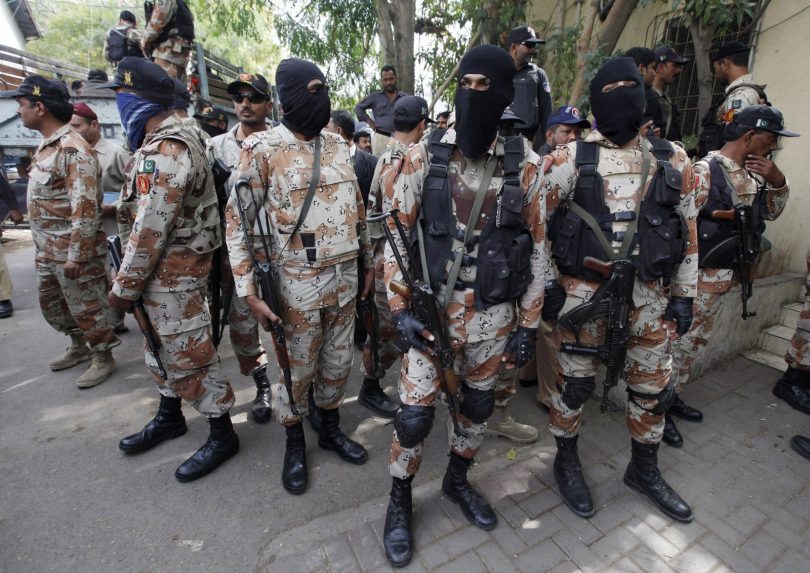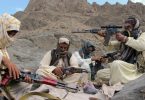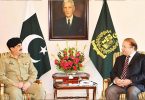It was in 1974 that Claude Chabrol came up with a brilliant movie aptly titled “Nada. However, what set it apart then, and even today in most aspects, is how it quite easily manages to capture the laughable pointlessness and sinister grandiosity of some of the movements of that era, movements which would qualify as quasi-terrorism by today’s standards and were at the time considered social and political pariahs. Be it the Baader-Meinhof thugs in Germany, the Red Army Faction in Japan or the Red Brigades in Italy, all these outfits seemingly believed in their right to kill, without any remorse. Their tactics and the way they conducted themselves to further strengthen themselves were well documented then, though they never managed to accomplish something quite to the extent that it would allow them to become a household figure. Any glance back at history and the origins of the concept of terrorism in modern times will have to include the mention of these groups. Concurrently, in the same era, there were other groups such as the Basque ETA or the Palestinian “Black September”, which used crooked and detestable tactics as well and whose goals were considerably more direct and well established than those mentioned earlier, and more importantly, whose aims could be understood and judged to some extent.
Chabrol’s title is a recall of an earlier word used to describe this sort of licentious malice- Nihilism. The tendency to disassociate oneself from this word and know that death is coming, and not being able to wait for it. When given a more political motive, a motive to strive for the implementation of one’s ideology over others and to be prepared to sacrifice one’s life to see that goal fulfilled is both ironically nihilistic and sadomasochist on a more collective level. It is the idea of demanding the outright impossible and demanding it at gunpoint.
What has transpired in the world since that decade of the 70’s has had an unquestionable impact on all spheres of life around the world; the fall of the Soviet Union, the success of the CIA’s covert support to the Mujahedeen, and the rise of another conundrum for the west i.e. militant Islamic fundamentalism. The civil war that followed in Afghanistan managed to bring the Taliban into power. While all this was playing out, this new problem was just starting to come to the attention of the West. Now one might wonder and indeed deliberate over how Pakistan got involved in the first place. Pakistan’s exploits and its role in the Afghan Jihad are indeed well known and well documented, and when the war was over, Pakistan itself was trying to establish or rather re-establish democracy within itself but it faced the similar problem that the West faced i.e. of extremism. The only major difference was that this problem was literally next door and 9/11 made it immeasurably more momentous. Pakistan’s U-turn policy regarding Taliban made it the primary victim in the region. There must be some reason why it finds itself in combat with these ingenious individuals who’ve become fascinated with an ideology that seeks to impose an absolute authoritarian theocracy and has taken a violent and gruesome path towards attaining that. A case can be and should be made about how in order to consolidate its own position, at some instances, Pakistan had to provide patronage to these elements. The justification lies in the threat from the eastern border i.e. India with whom three wars have been fought since independence, and the same kind of threat could not be afforded on the western front i.e. Taliban in Afghanistan. However, such a topic would be better left for another day.
For now, the primary issue is that though exceptions do exist, one can candidly state that these nihilist tendencies arise from an inner and much more delicate psychological need to be subservient to a cause. The perpetrators have taken it upon themselves as their divine duty to ensure that they play their part in this ludicrous quest to establish an ardent form of theocracy. This process won’t stop even if it is established in the states where they form a majority, even then, they will infiltrate and attempt to disrupt the framework of other secular societies as well.
One a very frequent and rather misused anecdote that defenders of these miscreants’ use, is the expanding reach of West and specifically of American imperialism. This expansion was a threat and the menacing reality of terrorism is simply a response to the ever-escalating notches employed by the US in key areas, specifically in the Middle East. However, one must also be ready to entertain an opinion against this position: what else were the perpetrators of the 9/11 attacks hoping would be the response? Surely not that their demands, ridiculous and malleable in any merit whatsoever, would be met? Or perhaps it’s the opposite, they knew that this would be the response and they were in anticipation of it. It is the prime facet of a nihilist that he not only craves death for himself but for others too if he can. In any case, the argument mentioned above would’ve held a significant merit on its own without pretext. It, however, loses whatever credibility it might have, or might claim to have, when in order to protect their people they will mercilessly kill their people, an accusation that can be made against virtually every Jihadist militant outfit. To say here that “one man’s terrorist is another man’s freedom fighter”, is both, glib and evasive, considering the horror tactics used. These are used not to free the oppressed from a supposedly imperialist foreign power, but to replace that foreign imperialism with a domestic authoritarian theocracy- none of which bears the slightest bit of semblance with human emancipation.
So, where does this tendency lie? History as we know it is divided in two, Before Christ and After Death; but for the generation that exists today, another such division of the world history occurred when on the 11th of September, 2001, arguably the grisliest terror attack took place, carried out by al-Qaeda to further its own ambitions. Not only did it rock its intended target, the US, it also managed to send shivers down the spine of any nation that called itself an ally of the US and so a war started, a war that rages on even today with no end in sight. It’s been noted on several occasions, the problem with waging war against an idea, and make no mistake about it, it is Islamic extremism that fans the flames of terrorism, is that no one can be quite certain of whether one’s winning or not. How is it to be measured? In its war against terror, the US knew it could not fight alone. No matter how noble the cause, how gratuitous the intentions, how impeccable the resolve, one needs allies when fighting in a foreign land having no viable knowledge of the region. The US had already made such an error in Vietnam, underestimating the enemy, misreading the situation and a completely infertile response to what was a failure of not only the US’s diplomacy on the issue but also its evaluation of the situation. No such error was to be repeated in Afghanistan- it’s rallying cry of “either with us or against us” could be called a classic case of the Goliath issuing a conceited threat but it did accomplish what it was supposedly meant to accomplish; there was scarcity of allies in the region, the chief of which still stands shoulder to shoulder with the US in its war in Afghanistan. The Islamic Republic of Pakistan, a country which has had to pay an immoderate price for being a participant in this war with casualties to its civilians and armed personnel alike, a severe strain on its already fragile economy, and a society which has become more and more precarious in these past 16 years; all this an equivalent price of standing against terrorism and any ideology that claims to use terrorism as a means to their end. For Pakistan, terrorism is the end for such outfits and its war on it continues even today.
It is 2017 now and for the US the situation has gotten from worse to “Armageddon level” worse. While it waged the war on terror with the ambition of abolishing terrorism, its actions have led to even more Jihadi outfits springing up all over the globe. It has overseen the formation, the rise to power, and now the probable demise of ISIS. Its fluctuation stands on exactly how to differentiate and deal with the Taliban and al-Qaeda and most importantly on how it would view the efforts made by its closest ally in the region. For the ally itself, Pakistan has made significant strides in its efforts to hunt down and eradicate any elements that hope to bring about the forced rule of their militant ideology; most of which is a hard-line extremist version of Islam. This ideology seeks to destroy the pledge made by the founder of the land, Quaid-e-Azam, about Pakistan being a place for all to practice their religion as they please.
The most important step that has been taken by Pakistan has been to counter the terrorist initiative by responding with force. Though there have been protests by certain sections of the society, it must be remembered here that the terrorists being dealt with her wish to exterminate that very right from the society. Each person and citizen may have their own opinions on how this issue must be handled and that right is exactly what the armed personnel are fighting to protect. As mentioned earlier, the whole framework of terrorists is built upon a uniform structure, a structure that is designed specifically to cater to a traditional “supply and demand” equation. As the ambitions of terrorists grow, they will invariably want to scale up their operations, attempt bolder theatrics and challenge the writ of the state to the highest degree possible. It is the supply side which acts as the head of the hydra. It is what feeds the pits of hatred, ideological hatred for the state. It has to be dealt with in hard terms to ensure that no other relapses occur and once taken out, the supply sides remain out. This has to be done through rigorous intelligence-gathering as well as through forceful army operations to make it certain that such elements are done away with as promptly as possible. As Dr. Maleeha Lodhi, the representative of Pakistan at the United Nations, said in February 2017,
“…the country has shown the will, capacity and resilience in combatting terrorism and that Pakistan’s campaign has now entered its most intense phase, but this has only strengthened our resolve to continue our campaign until the last terrorist is eliminated from our country…”
She is undoubtedly echoing the same sentiments held by many in Pakistan who believe that it is only the stern and resolute action that is going to yield the desired results, which would allow Pakistan to finally overwhelm this menace which it has faced for almost the past two decades.
To ensure that the supply side could indeed be wiped out decisively, it was necessary to ensure that their source of finances was choked which is what the Anti-Money Laundering Bill 2015 managed to do. It allowed the various commercial banks as well as the Central Bank the chance to freeze accounts of the law enforcement agencies suspected of supporting such elements. And by virtuoso expertise on board, it must be noted that till date the State Bank has managed to put a stop to almost Rs.1 billion being transferred to be used almost certainly for terrorist purposes. In addition to that, authorities have claimed to have recovered nearly Rs.250 million being transferred in Hawala.
With regards to the aforementioned strict measures to eradicate terrorist networks, substantial steps have been taken to kerb their influence and limit whatever plans they had, such as the establishment of 11 military courts which have so far trialled nearly 140 cases, with 55 cases reaching their conclusion. One wonders what has led to FATA becoming the epicentre for terrorists and their activities within the region. While the reasons aren’t generic and in no way naïve, the primary factor has been the centuries old socio-economic narrative, coupled with a political structure so fragile, that it has allowed insurgents from the other side of the Durand Line to infiltrate quite easily. The armed forces have steered their efforts ever since the start of Operation Zarb-e-Azb, to not only confront the terrorists head on but also target the whole region that these terrorists have so often targeted to their maximum advantage. Stringent border patrols and an unyielding attitude towards those crossing over have led to successes for such initiatives. Everything said and done, it has been through this renewed sense of duty that Pakistan managed in 2015, to witness the least amount of terrorist activities since 2007; a hallmark achievement for the armed forces.
As per the numbers released by the ISPR, till date nearly 3,400 terrorists have been eliminated, 183 of them being senior leaders, commanders, and strategists. More than 800 hideouts have been destroyed with important intel extraction. Nearly 21,000 terrorists have been arrested and this, through interrogation, has made it possible to gain more insight and information regarding terrorist activities. This invaluable achievement has come at a hefty cost though. About 488 officers of Pakistan Army, Frontier Corps and Rangers have had to lay their lives in this struggle against terrorism while nearly 1900 have been badly injured. The battle carries on, but the immense sacrifices that these officers have made for ordinary Pakistanis to be safe should never be forgotten.
This was how one could begin to address the supply side, i.e. the origin point. Now we come to the point where these nihilist foot soldiers are created and taught nothing but hatred and contempt for individuals they’ve never met. Although steps and initiatives are underway to eradicate that side, one must then invariably turn attention to the flip side of the coin; the supply side is indeed simply a means to an end. The supply is the means; the demand is the end- the demand to increase this tendency within those willing to join their ranks and keep the eternal war machine fuelled by hatred and contempt and a misguided sense of purpose going on for as long as possible. It goes without saying that this ideology is what constitutes the prime source of all problems being faced by the world today. Were it not for the radicalization that took place during and in the immediate aftermath of the Cold War, things might have been different. But now that it has reached this point, it is necessary to address the issue that the mindsets which have been indoctrinated should be enlightened through an evolutionary process. There’s ample evidence in our recent dealings with these terrorists that military action merely stamps out the seeds- the seeds which are sown deep down within these elements psychologically. It will only be through a systemic process of rehabilitation, psychological re-evaluations, and counselling that these elements can truly be cured. It will take a united, consolidated, political effort to dismount this mentality, one which will require an outpour of resources on human development in impoverished areas. The youth of such impoverished areas are usually the masterminds behind such activities. Education, health, employment, and the standard of living within these areas must be elevated to level them with the other urban areas of the country. For too long, they have been allowed to defend themselves rather helplessly without much assistance from the democratic forces within the country.
It’s high time that initiatives were launched with the intention of bringing these impoverished areas into the mainstream fold, allowing them to truly benefit from what the country has to offer. It would lead to a massive bulge in an already worthwhile tourism industry budding in Pakistan’s Northern Areas. If these areas could be developed further, its people trained to be professionals of this industry, then the productivity from this venture could add significantly to Pakistan’s economy. It could further strengthen the standard of living of the local population. It truly is a win-win for all parties concerned if they could simply come up with a long-term, sustainable plan to deal with this problem of extremism.
Another important step at this juncture would be to employ a thorough analysis of the literature being put forward by the terrorist groups such as the Taliban, al-Qaeda and the numerous other terrorist outfits operating in the country. It would allow the armed forces to better understand the enemy. It would be folly not to pursue this channel and try and evaluate the exact bearings and reasons for this sense of hatred within the organisations. It also would allow the agencies to come up with better counter literature that adequately seeks to rival and counter the narrative being pushed by these hard-line outfits.
This is where the intellectual process of fighting ideas with ideas comes in. It is necessary to replace extremist ideology with one that is more progressive and considerably less intolerant. It would be an act of intellectual culpability to abandon the idea of countering their ideas. It is necessary for the state to work closely in conjunction with the Ulema to ensure that the existing hateful literature can be ideally replaced with a more tolerant version and interpretation of the Holy texts, keeping in view the changing dynamics of this world. In the end, of course, it is the youth which is most influenced by the insinuations of these ideas. Efforts must be doubled to ensure that the professionals who are willing to contribute to the growth and nurturing of these youths are given all the resources possible to carry out their tasks in the best way possible. It would be wise, albeit controversial, to abandon the concept of borrowing from Salafism and Wahhabism, the schools of thoughts which have for years been scorned as primary sources for religious hard-line extremists, who adhere to this specific ideology, the subscribers of which are uber-conservative and unwilling to accept any notion of reformation and instead are fascinated by the idea of bringing back 7th century ideals. Their literature although should not be outright banned for there are many instances which are exploited in propaganda to harness more support. Instead, the government must ensure that the youth have access to the interpretations taught by those who are truly willing to see Islam in the modern world and not the other way around.
Coming back to the vacuum issue about what lies in store for the youth of the region once, hopefully, the issue of terrorism is indeed eradicated; as mentioned earlier, their constant rehabilitation through education of a more tolerant and less muddled interpretation of the holy text that would present the real idea of what our religion truly stands for.However, this should only be a starting point. For example, we know now that for years, these extremist outfits have used art and literature as an effective propaganda tool, to install their desired mindsets in the mentality of the youth, hailing themselves and like-minded fundamentalist organizations around the world as liberators fighting against the imperialist westerners, and their local, domestic subjects acting as lapdogs for their masters’ command. Such a narrative was for years the primary source of any entertainment for the youth of these regions. Again, a counteractive program that introduces after-school programs comprising cultural activities, and indeed, sports can be of help to instil in them the true spirit of collective working, to earn their goals for their country and for themselves while abstaining from any acts of extremism.
. Sooner or later, the youth of today will become the adults of tomorrow, and if at that stage, they have been taught to reject the advances of extremist tendencies and subscribe more to their reasoning and logic, one major victory is achieved. Political parties also must play their part and contribute to the political growth of these regions by including them in their manifestos and plans which will allow for a more democratic approach to solving their problems. This can be a significant step in reforming that age-old feudal system that has been in place for decades.
And perhaps most importantly in modern times, the media can perform a vital role in the elimination of these extremist elements within the state itself by promoting and highlighting the efforts of the brave armed forces and the sacrifices being made by them every day while also concurrently exposing the duality and monstrosity of terrorist outfits. How they have their own misinterpretations of the Holy text and are willing to eliminate anyone not ready to bow down to their barbaric methods and mentality. One palpable measure on account of the media would be to not allow terrorist outfits a platform on which they spew their hatred and propaganda, while also constantly performing its job of vigilance and reporting on the self-denial of the terror outfits’ own ideology.
Curbing the coverage of the terror activities would surely hurt the ambitions of these outfits. Certainly, one reason why these attacks take place is to draw attention to the outfits and their manifesto, their past deeds and their demands, their vision and what they wish to achieve. All of this is provided a free of cost platform when many news outlets are eager to cover them. Although it may clash with the journalistic integrity of many, one must wonder, wouldn’t it be effective if this platform were to be taken away from them altogether? In any case, such a step would be a positive step towards reducing the influence of these groups instilling fear in the population.
Moreover, it would be a constructive development if most of the talk-shows devoted their resources towards presenting objectivity, evaluating the current situation with objective input, and presenting a critique of the methods being used by the government, and the attitudes employed by the opposition. This would promote the idea of being aware of all sets of circumstances without compromising the integrity of the whole operation.
The unsurpassed counter-terrorism chronicle is to persuade the people and take them into confidence against the war against terrorism. It is a war for our state’s existence: Terrorism is a deterrent to Pakistan’s expansion and is the prime threat to the economic, social, and political development of the country. The country has been plagued by terrorism for over a decade in which more than 50,000 people, both civilians and security personnel, have been killed besides the economic loss of US$ 100 billion.
Consequently, there should be zero leniencies for terrorism both at the state and society level. To comprehend what causes terrorism, one should not be concerned about the economic state of the society. Rather one should ask who holds the strong reins of political views to impose them through terrorism. The comparison between ideology and religion brings more complexities. The idea that is widespread is that terrorism has no religion. Whatever efforts are made should be made more efficiently with variety of interventions. Only by comprehending and addressing the ideological and most importantly,the individual-level roots of terrorism do nations stand chances of eliminating this curse of chaos completely.







